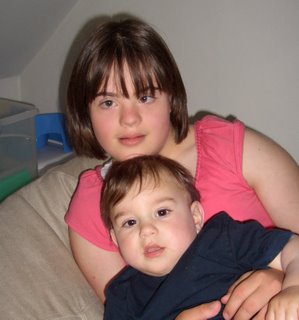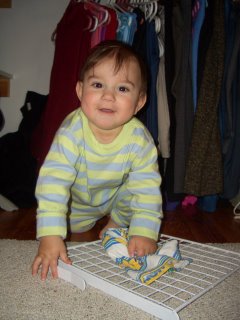The Good Jobbing of Henry
My husband and I have been trying to avoid saying "Good job!" to Henry, because, as Alfie Kohn contends in his essay Five Reasons to Stop Saying "Good Job!":
It's a tough habit to break, but we've been working on it. However, getting others on board isn't as easy. Getting my stepdaughter -- who has Down syndrome -- on board is near impossible.

Maddy adores her little brother (and he loves her, too). She naturally wants to praise him for every little thing -- drinking, eating, standing. A definite Kohn no-no.
We've tried to explain to her that we're not saying "Good job!" to Henry. This is how it's been going:
A few weeks ago Henry was in his high chair, drinking out of a straw, when I overheard Maddy tell him, "Good job!" I gently reminded her about our "rule."
Two minutes later Henry took another sip and Maddy said, "Good job, buddy!"
"Maddy, we're not saying 'good job' to Henry, remember?" I said.
She gave me an exasperated look and declared, "I say, 'Good job, buddy.'"
Then last week Henry, who is just nanoseconds away from walking, was doing some unassisted standing. Maddy saw him and did the whole "Good job!" thing, so I gave her a very gentle reminder.
She asked me what she should say instead, and thinking that giving her something to say would be more effective than telling her not to say anything, I responded, "Well, you can just say what he's doing, like, 'Henry, you're standing up!'"
A few minutes later Henry was at it again and I heard:
"Henry, you're standing up!" Pause. "Good job!"
What kids...need is unconditional support, love with no strings attached. That’s not just different from praise – it’s the opposite of praise. "Good job!" is conditional. It means we’re offering attention and acknowledgement and approval for...doing things that please us.
It's a tough habit to break, but we've been working on it. However, getting others on board isn't as easy. Getting my stepdaughter -- who has Down syndrome -- on board is near impossible.

Maddy adores her little brother (and he loves her, too). She naturally wants to praise him for every little thing -- drinking, eating, standing. A definite Kohn no-no.
We've tried to explain to her that we're not saying "Good job!" to Henry. This is how it's been going:
A few weeks ago Henry was in his high chair, drinking out of a straw, when I overheard Maddy tell him, "Good job!" I gently reminded her about our "rule."
Two minutes later Henry took another sip and Maddy said, "Good job, buddy!"
"Maddy, we're not saying 'good job' to Henry, remember?" I said.
She gave me an exasperated look and declared, "I say, 'Good job, buddy.'"
Then last week Henry, who is just nanoseconds away from walking, was doing some unassisted standing. Maddy saw him and did the whole "Good job!" thing, so I gave her a very gentle reminder.
She asked me what she should say instead, and thinking that giving her something to say would be more effective than telling her not to say anything, I responded, "Well, you can just say what he's doing, like, 'Henry, you're standing up!'"
A few minutes later Henry was at it again and I heard:
"Henry, you're standing up!" Pause. "Good job!"












